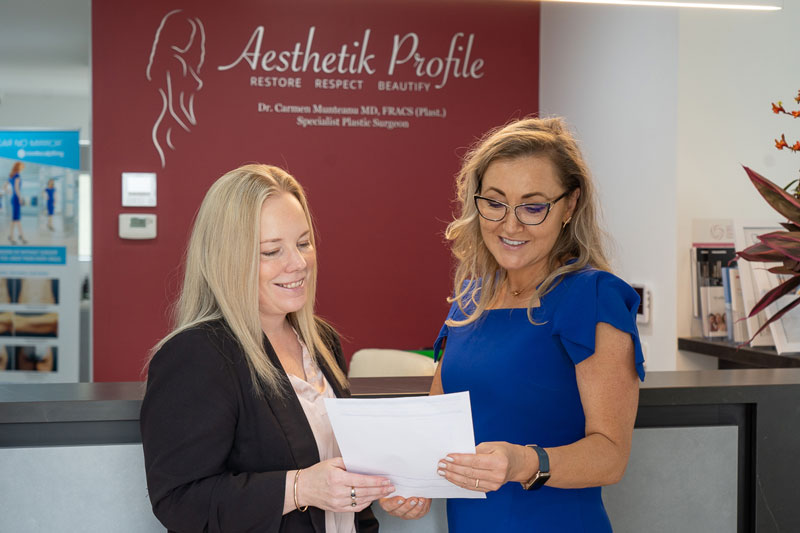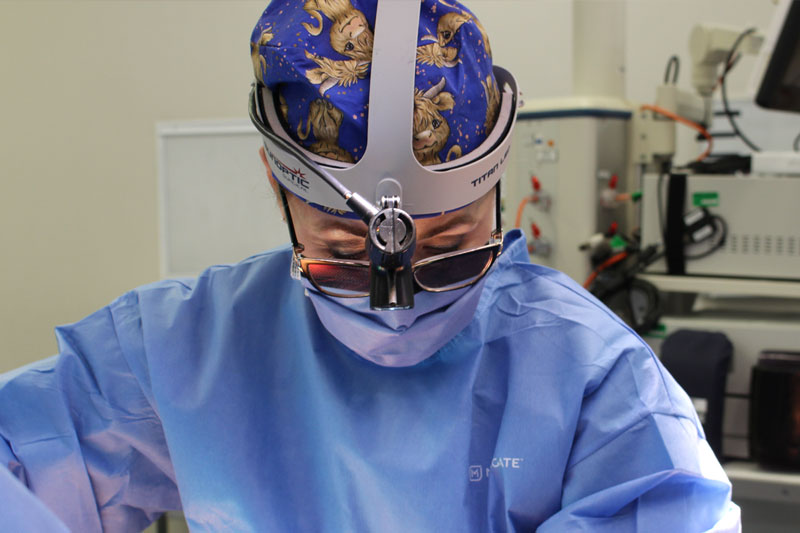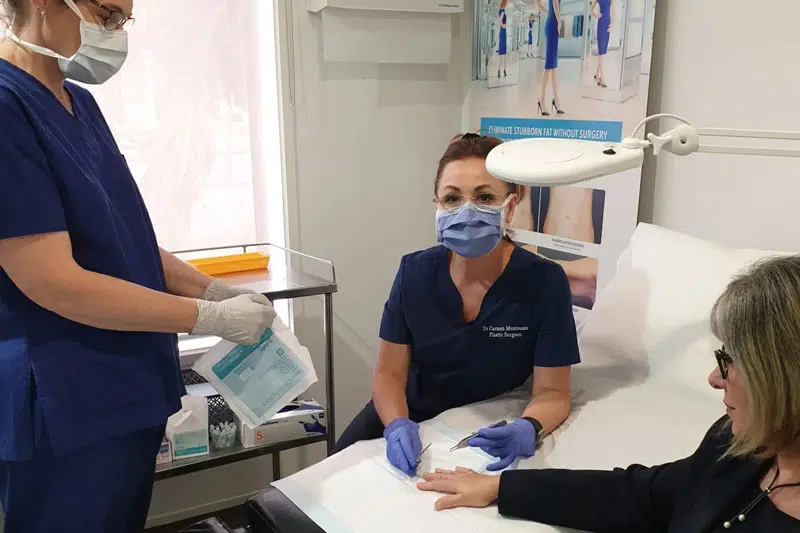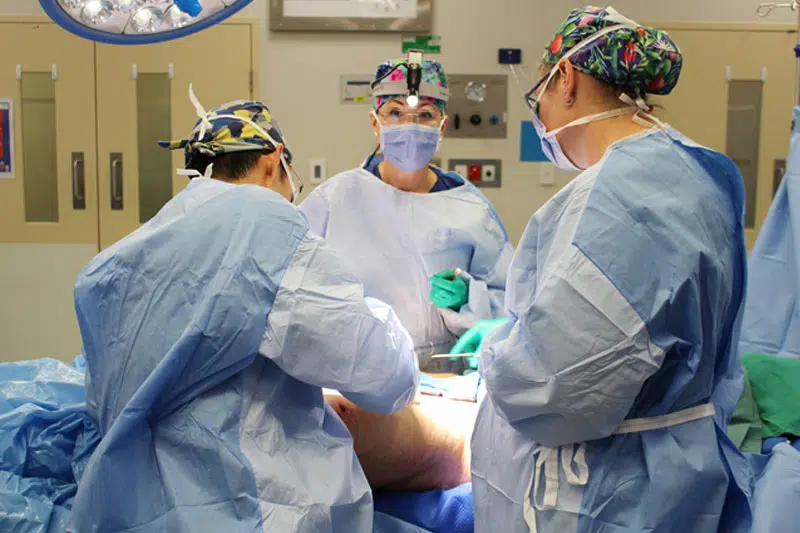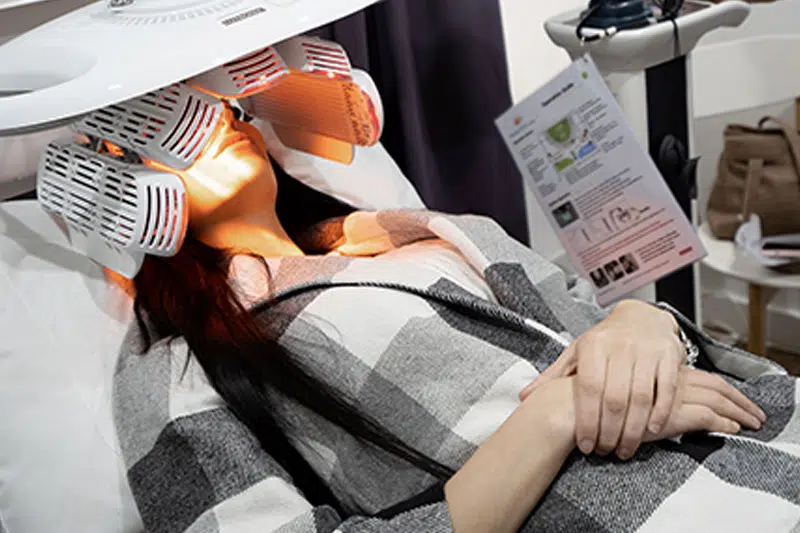Risks and Complications of Plastic Surgery with Dr Carmen
Understanding Risks and Complications of Plastic Surgery
Before undergoing any surgical procedure, it’s important to be fully informed about the potential risks and complications involved. As part of your consultation and informed consent process, Dr Carmen Munteanu will take the time to carefully explain the possible outcomes, risks, and factors that may influence your recovery.
While Dr Carmen and her team are committed to upholding the highest standards of care and will take every step to reduce potential risks, complications can still occur. Surgery involves shared responsibility, achieving optimal outcome requires patients to follow pre- and post-operative instructions, allow adequate time for rest and recovery , and communicate openly throughout their surgical journey.
This page includes an overview of general surgical risks, as well as risks specific to different procedures, to help make sure you have access to clear and comprehensive information before making any decisions.
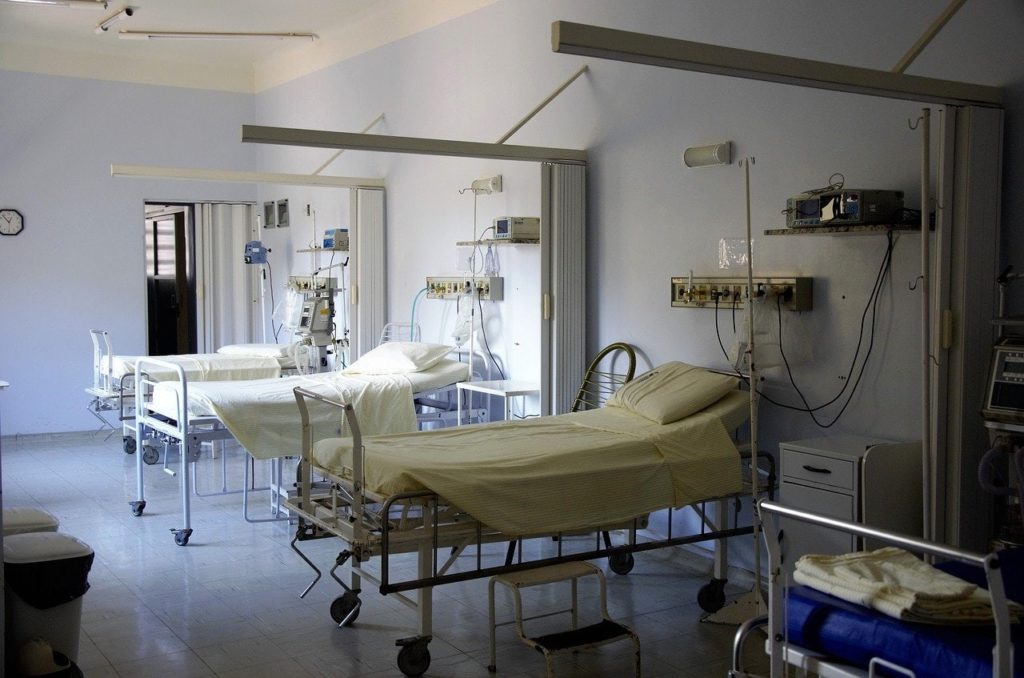
Risks and Complications that may apply to ANY surgical procedure
General Anaesthetic
General anaesthetic is used during many surgical procedures. While anaesthesia is routinely administered by qualified anaesthetists, it carries potential risks. These risks can vary depending on the individual’s health, the type of procedure, and other contributing factors. Potential side effects or complications may include:
- Nausea or vomiting after the procedure.
- Sore throat or hoarseness related to the breathing tube used during surgery.
- Shivering or chills as the body adjusts after anaesthesia.
- Headache, tiredness, or dizziness during the initial recovery period.
- Allergic responses to medications or anaesthetic agents (uncommon but possible).
- Temporary confusion, memory changes, or disorientation, particularly for older patients.
- Breathing or cardiovascular difficulties, especially for individuals with underlying medical conditions.
- In rare situations, awareness during the procedure or delayed recovery may occur.
- Serious risks, such as stroke or heart complications, are uncommon but may be associated with general anaesthetic in certain circumstances.
Before your surgery, your anaesthetist will review your medical history and discuss relevant factors that may affect your anaesthetic care. If you have any questions or concerns, Dr Carmen and the team are available to support you throughout the process.
Pain
Some discomfort is expected following surgery. Prescription or over-the-counter pain relief may be recommended to assist during the early recovery period. If your pain increases unexpectedly or becomes difficult to manage, contact our rooms promptly. If assistance cannot be reached, please attend your nearest hospital or emergency department.
Numbness / Changes in Sensation
Some patients may experience reduced sensation or numbness in the area surrounding the surgical site. This can occur if sensory nerves are affected during surgery. In many cases, sensation gradually returns over time, though long-term or permanent changes can occur in some instances.
Internal Bleeding (Hematoma)
While bleeding points are addressed during the procedure, bleeding can occasionally occur after wound closure. If this leads to swelling or discomfort, a return to the procedure or operating room may be required to investigate and treat the issue.
Fluid Accumulation (Seroma)
Following surgery, some patients may develop a build-up of fluid under the skin near the treatment area. If this occurs, further management such as drainage may be needed. This can often be performed in a procedure room, though in some cases a return to theatre may be required.
Allergic Reaction
Unexpected allergic responses may occur. It is important to disclose any known sensitivities or allergies to surgical materials, medications, or topical preparations during your consultation. This may include reactions to suture materials, surgical tape, glues, antiseptics, or anaesthetic agents.
Infection
Infections can develop despite sterile surgical conditions and the use of antibiotics. Bacteria are present in our everyday environments, and the surgical site may occasionally be affected. Cleaning your skin thoroughly prior to surgery, following all aftercare instructions, and attending follow-up appointments are important steps in reducing the likelihood of complications such as infection.
Wound Healing / Wound Breakdown
Healing outcomes vary between individuals and may be influenced by factors such as circulation, skin quality, or the presence of medical conditions. Wound breakdown or delayed healing can occasionally occur. Smoking, vaping, and the use of nicotine products significantly increase the risk of complications in wound healing. It is recommended that all nicotine products be ceased well in advance of your procedure and not resumed during the recovery period.
Scarring and Keloid Formation
All surgical incisions leave scars. The appearance of scars varies from person to person and from procedure to procedure. Some may be fine and fade over time, while others may remain raised, red or thickened.
In certain individuals, keloid or hypertrophic scarring may develop. Treatment options for scar management or revision can be discussed if required. Avoiding smoking and nicotine products may positively impact scar outcomes.
Blood Clots (Deep Vein Thrombosis – DVT)
A deep vein thrombosis refers to the formation of a blood clot in the deep veins, typically in the lower limbs. This can occur post-surgery, especially with reduced mobility. Patients with a higher body weight or a family history of clotting disorders may be at increased risk. Blood-thinning medication, compression garments, and movement strategies may be recommended to reduce the likelihood of clot formation. A pulmonary embolism may occur if a clot travels to the lungs, which is a serious medical complication.
Pulmonary embolism (PE)
A pulmonary embolism occurs when a blood clot travels to the lungs and blocks one of the pulmonary arteries. This can affect breathing and reduce oxygen levels in the blood. In some cases, it may cause chest pain, shortness of breath, rapid heartbeat, or other serious symptoms. Pulmonary embolism can develop after surgery, particularly in individuals with reduced mobility or other risk factors such as a history of blood clots. It is considered a medical emergency and requires prompt treatment.
Cardiac Events (Heart Attack)
Though uncommon, heart-related complications may occur, especially in patients with pre-existing cardiac conditions or risk factors such as age or lifestyle-related illness. If required, additional tests or a referral to a cardiologist will be arranged to assess your suitability for surgery.
Ways to Help Reduce Risks and Support Recovery After Surgery
There are several important steps you can take to assist with your recovery and reduce the likelihood of complications following surgery. These actions can help support the healing process and are an important part of your overall surgical care.
- Carefully read all pre- and post-operative information provided to you. It is essential to follow Dr Carmen’s instructions precisely. This includes allowing adequate time for rest and recovery, wearing any recommended compression garments as directed, and avoiding removal of dressings or touching the surgical site until advised that it is appropriate.
- Avoid smoking, vaping, or nicotine use before and after surgery. Nicotine products can significantly impact healing and increase the risk of complications.
- Provide a full and accurate list of all medications, supplements, and vitamins you are currently taking. It is important to disclose this information to both Dr Carmen and your anaesthetist, as some substances can affect your surgery or recovery.
- Share your complete medical history, including any previous concerns or complications with surgery, anaesthesia, or wound healing. This information is vital for your care and helps the surgical team make informed decisions.
- Use an antibacterial wash to cleanse your body thoroughly the evening before and the morning of your surgery. This may help reduce surface bacteria and lower the risk of infection.
Remember that the outcome of any surgical procedure is influenced by several factors, including realistic goals, personal health, clear communication, and a strong understanding of both the potential benefits and risks. Dr Carmen and her team are available to guide you through every step of this process.
Procedure Specific Risks and Complications
There are additional risks that may apply to specific procedures, such as breast surgery, body surgery, and procedures involving the face like Facelift, Neck Lift and Blepharoplasty which are now available with Dr Gary Kode at Aesthetik Profile. These specific risks will be discussed in detail during your consultation.
You can also find an overview of these procedure-specific risks listed in the sections below.
How Risks and Complications Are Managed
Dr Carmen Munteanu and her team are committed to patient safety and high standards of care. Each procedure is carefully planned, and every effort is made to reduce the likelihood of complications. This includes thorough pre-surgical assessments, the use of surgical techniques, and post-operative monitoring to support the recovery process. Surgery is performed in accredited hospital facilities that meet strict safety standards. Throughout your surgical journey, you will be provided with clear aftercare instructions and follow-up appointments to closely monitor your progress and recovery.
Your Role in Reducing Risks
While your surgeon (Dr Carmen or Dr Gary) will take every reasonable step to reduce risks, your actions also play a significant role in the outcome of your procedure. Following your pre- and post-operative instructions carefully is essential. This includes allowing adequate time for rest and recovery, attending all follow-up appointments, and being open about your medical history and any medications or supplements you are taking. Avoiding certain behaviours, such as smoking or using nicotine products, is also important as these may affect healing and increase the chance of complications. Clear communication with your surgeon and care team is key throughout your recovery.
Understanding That Outcomes Can Vary
It is important to understand that each person’s body responds to surgery in its own way. Healing times vary between individuals, and some procedures may require a longer recovery period before the final outcome is apparent. While your surgeon will aim to achieve your desired result, no surgical outcome can be guaranteed. In some situations, further treatment or revision surgery may be required. Your surgeon will discuss realistic expectations with you and provide guidance throughout your surgical journey.
When to Seek Urgent Medical Attention
While most patients recover without serious issues, it is important to be aware of signs that may indicate the need for immediate medical care. If you experience symptoms such as sudden or severe swelling, persistent or heavy bleeding, difficulty breathing, chest pain, or unexpected changes in vision, it is essential to contact your surgeon or seek emergency medical assistance without delay. Acting promptly can be an important part of addressing any unexpected concerns after surgery.
Disclaimer
All surgery carries risks, both general and procedure-specific. Risks can vary based on individual health factors, procedure type, and surgical technique. This page is intended to provide information for general understanding. Detailed discussions tailored to individual circumstances will occur during the consultation.
The information on this page is provided for general guidance to help you understand potential risks and complications associated with plastic surgery procedures. It is not a substitute for a personal consultation. During your consultation, your surgeon will explain the risks specific to your procedure and individual circumstances in detail, as part of the informed consent process. All surgical procedures carry risks, and it is important to carefully consider this information before proceeding.

